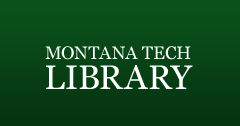Copyright of Items in the Digital Commons @ Montana Tech
Items in the repository are protected by a variety of copyright options including:
Copyright ©
Many of the items in the repository are copyrighted in the U.S. by their original authors/creators or by the publishers to whom those rights have been transferred.
Inclusion in this open-access online repository does not alter the copyright status of any document. The holders of copyright are declared, in most cases where they are known, and these are the parties who control the rights to further re-use of the materials.
Materials are intended for educational or scholarly purposes. Users are free to download, save, and print materials found here for their own use. For items covered under Copyright ©, users should not re-publish, re-post, or redistribute materials without permission from the holders of copyrights.
Creative Commons Licenses
Materials published under some Creative Commons Licenses may be re-used, re-posted, etc., for non-commercial purposes as long as credit or attribution is given to the original authors and publications. For other Creative Commons licensing options see Creative Commons.
Public Domain
Materials that are in the public domain may be re-used in any way without limitation. These include:
- works published before January 1, 1923
- works published before January 1, 1963, without copyright notice or whose copyrights were not renewed
- works whose authors have been dead for more than 75 years, unless previously copyrighted and still within term
- works published by the U.S. government, including US Patents and works by US government employees created in the course of their official duties
- works of Florida state employees created in the course of their official duties
Fair Use
The doctrine of Fair Use permits the quotation or reproduction of excerpts from a copyrighted work without permission. The entire work, however, may not be excerpted. There is no rigid standard, but quotation of excerpts less than 1 page are generally considered allowable.
U.S. law permits the classroom display or use of copyrighted works within the context of instruction at an accredited non-profit educational institution without further permission. However, this does not extend to distribution of such works. For more information on Fair use, see the U.S. Copyright, June 2012.
Under current law, copyright is granted automatically and immediately to the author/creator of a work; there is no requirement for registration or notification.
These rules apply in the United States; foreign and international copyright rules may vary.
For more on copyright see the U.S. Copyright Office, Creative Commons, or Copyright Basics at the Copyright Clearance Center.
Contact: Conor Cote; ; 406-496-4839
